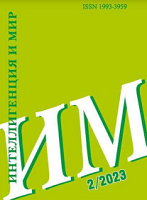К вопросу о борьбе либеральной интеллигенции за отмену смертной казни в Российской империи в период первой русской революции
The struggle of the liberal intelligentsia for the abolition of the death penalty in the Russian Empire during the first Russian revolution
Author(s): Alena P. TsumaravaSubject(s): History of Law, Criminal Law, Pre-WW I & WW I (1900 -1919), Penal Policy
Published by: Ивановский государственный университет
Keywords: death penalty; capital punishment; liberals; intelligentsia; struggle for rights; revolution; public opinion;
Summary/Abstract: The study is based on published in the early XX century statements in the press, collections of articles and analyzes of the opinion of the liberal intelligentsia on the need to abolish the death penalty in the Russian Empire. The author aimed to complete the following tasks: to consider the worldview and motives of the intelligentsia’s struggle against the death penalty, to characterize the intelligentsia’s perception of the revolutionary period of 1905-1907 and the results of the Russo-Japanese War in connection with the issue of the death penalty, to study the political, legal, juridical arguments used by the opponents of the death penalty. The study presents the views of the conservative and democratic intelligentsia on the existence and application of the capital punishment. The author pays attention to the exchange of opinions in the public space between the Russian and foreign intelligentsia which opposed the death penalty. The study reveals the characteristics of the historical period, internal and external challenges against which the use of the death penalty in the Russian Empire expanded in 1905-1907. The author describes the problematic field of the discussion on the existence of the death penalty: questions about the position of state power, the use of the death penalty as a means against revolutionary terror, the policy that indirectly led to the death of the accused, the presence of a complex of legal and procedural violations in the imposition and execution of the death penalty. The chronological framework of the study is determined by the events of the First Russian Revolution in 1905-1907. The period of the revolution presented a wide range of opinions, including those among liberals. On the one hand, left-liberal views were characterized, firstly, by considering the state as a system consisting of authorities and society, secondly, by the recognition of the right of society to revolutionary methods of struggle, the assessment of the policy of the authorities to expand the use of the death penalty as regressive. On the other hand, conservative-liberal figures accepted the existence of the death penalty but only within the boundaries outlined by law, and fought in the designated direction for the development of legislation, the improvement of procedural law and an exhaustive presentation of the grounds for the application of the death penalty. The liberal intelligentsia attached great importance to the publicity of the punitive policy which had an impact on the authorities. The results of the study lead to the conclusion that the minimum requirement of the intelligentsia was the development and application of strict, objective legality in the field of the death penalty. The maximum goal of the liberal intelligentsia was to achieve in the shortest possible time the complete abolition of the death penalty and the non-execution of the sentences imposed.
Journal: Интеллигенция и мир
- Issue Year: 2023
- Issue No: 2
- Page Range: 50-67
- Page Count: 18
- Language: Russian

